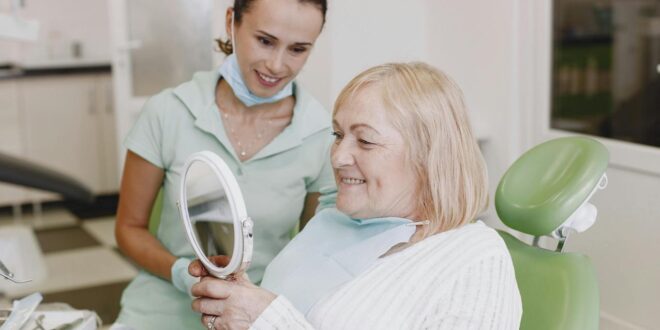The prohibitive cost of dental treatment continues to hit the headlines – and for good reason. From very basic dental check-ups starting at around $150 to specialist root canal repairs in excess of $800, many working-age adults, let alone those on retirement incomes, can ill afford to sit in a dentist’s chair. Seniors, however, face dental challenges specific to their season of life. This is because, as we age, a range of factors, including medical conditions, increase the risk of oral health issues. The following are just some to be aware of:
Damaging ‘dry mouth’
Saliva is an important substance for preventing tooth decay and gum disease. It helps wash food particles from our mouth and between our teeth, neutralises food acids that can attack tooth enamel, and contributes to preventing bad breath. Unfortunately, as we age, our production of saliva naturally decreases, resulting in a condition known as ‘xerostomia’ or ‘dry mouth.’
Medications and mouths
Some medications can also contribute to oral health issues, and they are often those seniors are more likely to be prescribed. Antihypertensives (taken to reduce blood pressure) can lead to an increased risk of gum swelling and ‘overgrowth’ (a condition where the gum extends over the teeth), and antidepressants and antihistamines can cause ‘dry mouth.’ Aspirin is acidic, and if chewed or held in the mouth, can damage tooth enamel. Asthma medications can also be highly acidic, and cause problems with tooth enamel if used regularly over an extended period of time.
Problems with plaque
Plaque is a colourless coating of bacteria and sugars that builds up on teeth, gums, dentures, and partial plates. If not regularly removed, it can produce acids that damage tooth enamel and lead to gum disease. Plaque build-up can affect people of any age, however seniors are at higher risk. That’s because, as we age, painful conditions (such as arthritis) can make it more difficult for us to manipulate our tooth brushes and flossing apparatus – the sort of tools we use to remove plaque from teeth and gums. Playing into this, is the simple fact age-related tiredness means we may feel we have less energy to devote to oral care. Cognitive decline can also contribute to a lack of dental hygiene routine.
Wear and tear
Whether it’s because of decay or gum disease, accidents or falls, seniors are often faced with tooth loss. This can cause remaining teeth to shift or wear down, and can result in further complications. Where dentures or partial plates are used to replace missing teeth, seniors must adopt a strict oral health routine to avoid problems. If these routines are ignored or forgotten, food particles can remain in the mouth, causing of build-up of acid which attacks tooth enamel. Dentures and partial plates are also another surface onto which plaque can adhere.
Impaired immunity
As we age, our immune systems are prone to weakening, and we have greater difficulty fighting off infection. This includes the sort of infection that sets up home in previously drilled teeth. As many seniors have a number of ‘filled’ teeth by the time they reach retirement years, the problem is exacerbated. Which is why repeat treatment of teeth becomes more necessary. Chronic health conditions such as diabetes can contribute to a weakening of the immune system, and can slow the healing which occurs after dental treatment.
Fading food habits
The healthy eating habits we adopted in earlier years can be swift to change as we grow older. Whole foods such as fresh fruit and vegetables and whole grain breads, can become harder to chew, and more time-consuming to prepare. The result is they are often replaced with softer, more processed foods likely to contain a higher sugar content which is not appreciated by teeth and gums.
Seniors face significant oral health issues, and although any dental care is costly, having regular dental check-ups and dental hygienist appointments is money well spent. When you do visit a dental professional, be sure to ask what you can do to manage the dental challenges specific to your age.









Maulee2714 - 11 months ago
The article on teeth is excellent. But no matter what you do, the cost of dental work if you have a problem is almost prohibitive. The annual increase will not help much. And I suspect the Winter Energy payment will be ‘saved’ not used, to pay for dental care, podiatry, safe and appropriate footwear, prescription glasses, hearing aids.